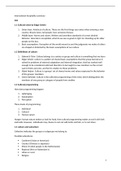Samenvatting
Summary Intercultural Sensitivity, ISBN: 9789023256885 International Hospitality, Entire book
Summary Intercultural Sensitivity for international hospitality. Everything you need for the exam. Grade received: 10 Samenvatting Intercultural Sensitivity voor international hospitality. Alles wat je nodig hebt voor het tentamen staat hier in. Cijfer: 10
[Meer zien]





